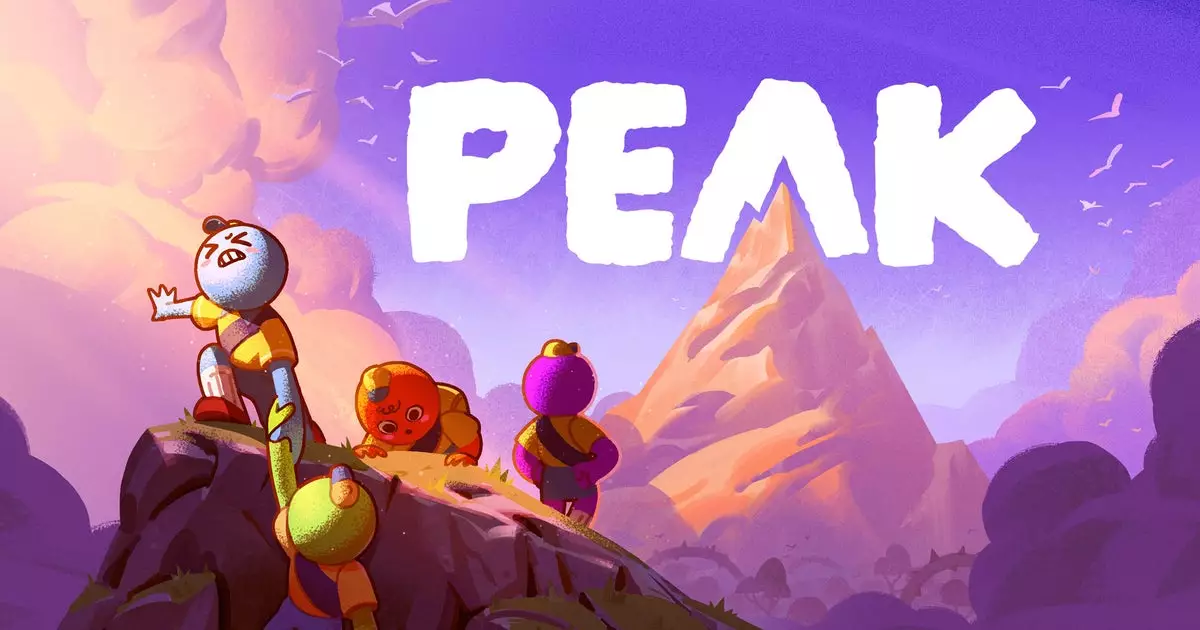The inception of a video game often comes wrapped in curiosity, camaraderie, and an unexpected array of emotions. In the case of “Peak,” the critically acclaimed co-op video game about mountain climbing, its journey began in an atmosphere marked by intense competition and, surprisingly, a touch of jealousy. This sentiment, as described by Nick Kaman of Aggro Crab, the development studio behind “Peak,” originally fired their ambition into overdrive. Kaman pointed out that it wasn’t merely a desire to create something riveting but a reaction to witnessing the success of a fellow game, “Content Warning,” generated from a similar one-month game jam.
Their experience serves as a vivid reminder that competition can fuel creativity. Initially, Kaman and his team felt overshadowed and demotivated, especially while on the verge of launching “Another Crab’s Treasure,” a labor-intensive project that exhausted them over three years. However, the surprise success of “Content Warning,” produced in significantly less time, sparked an inspiring realization. Their playful jealousy transformed into motivation, prompting them to partner with developer Landfall for their next game jam—this marked the genesis of “Peak.”
Building Dreams in a Month
What followed was an intriguing blend of determination, innovation, and a bit of spontaneity. Upon arriving in Korea, Kaman, together with his colleagues, set out to turn an Airbnb into a makeshift game development haven. A notable anecdote in this whirlwind journey involved a trip to IKEA, where the team spent hours assembling desks and chairs, a unique rite of passage for game developers that signified their commitment to this fervent undertaking. Not only were they working on an exciting project, but they were also simultaneously contributing to the local indie scene by planning to donate their furniture at the end of the month.
The process of crafting “Peak” itself highlighted the beauty of teamwork and shared ambitions. In those intensive weeks filled with late nights of brainstorming and gameplay mechanics, the developers forged a playful and creative environment necessary for innovation. The suggestion for “Peak” emerged from a casual conversation in a hot tub in Sweden the previous year, where idle banter transformed into passionate brainstorming and formidable ideas. Their vision evolved into a collaboration where lost scouts traversed an intriguing island, embracing the humor found in mishaps, emphasizing camaraderie over competition.
Anecdotes and Insights from the Developers
An integral part of the development experience was the decision to forgo conventional studio norms. The choice to immerse themselves in Korea, focusing solely on the project rather than the distractions that often accompany development, shared firsthand insight into the logistics and the emotional choreography involved in creating something beloved by many. Kaman noted that though it was an intense endeavor, it constituted some of the best moments he had ever experienced while making a game. This narrative resonates strongly in the gaming industry, where stress can often hinder creativity, making the balance of work and enjoyment a crucial aspect of successful game development.
Still, while “Peak” has enjoyed substantial commercial success, it is crucial to underline that financial accomplishment should never be mistaken for a benchmark of quality or artistry. The passionate trio at Aggro Crab and their colleagues at Landfall are seasoned professionals, experts who know what it takes to create compelling games. Drawing a correlation between swift development timelines and success could obscure the hard work, trial, and error that defines the game industry. The truth is that there is no “quick route” to creating memorable games.
The Spirit of Experimentation
At the heart of “Peak” lies a spirit of experimentation and a willingness to embrace failure and success alike. The willingness of developers to pivot from their initial vision—one that seemed sterile when contrasted with their final product—highlights an essential lesson in the world of creation: adaptability is critical. Collaborative projects like “Peak” remind us that the best outcomes often arise not merely from the original idea but from the collective synergy forged through teamwork.
This story, peppered with elements of competition, creativity, and camaraderie, serves as a beacon to independent developers everywhere. The narrative not only inspires but ignites a passion for pursuing innovative projects that capture the joy and chaos inherent in game creation. “Peak” emerged not just as a product of months of effort but as a testament to the unyielding spirit of collaboration and the surprising paths that lead to the most gratifying experiences in artistic ventures.

